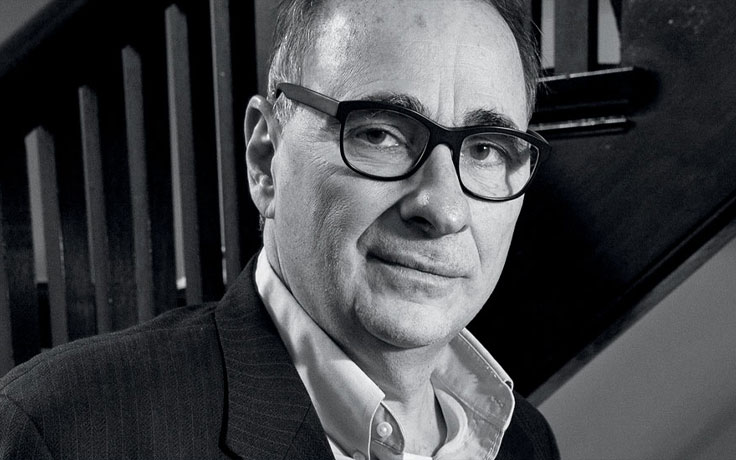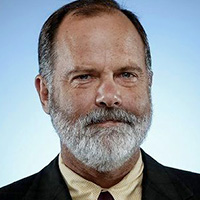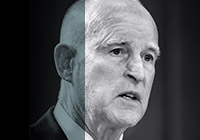David Axelrod once was a journalist. He began his career as an 18-year-old political writer for the Hyde Park Herald in Illinois before moving to an internship and then the night desk at the Chicago Tribune. In 1979, he covered the improbable mayoral campaign of Jane Byrne. When she won, he began covering City Hall and wrote a political column. His unhappiness with the direction of journalism, accelerated by a corporate-driven change of leadership at The Tribune, led him to jump to politics, where he was successful at a state and local level before the triumph that drew him to national attention, guiding the 2008 presidential campaign of U.S. Senator Barack Obama from Illinois to the White House. Axelord joined Obama as a special adviser on the White House staff and later wrote a memoir, Believer, which chronicled his life in politics and was widely and warmly praised.
Axelrod and Blueprint editor-in-chief Jim Newton first met during the 2008 campaign. Axelrod accompanied Obama to the candidate’s editorial board interview with the Los Angeles Times, where Newton was editor of the editorial pages. The Times endorsed Obama that year, the first time it had ever backed a Democrat for president. Axelrod and Newton got together again recently, this time in Axelrod’s Chicago office. Surrounded by Axelrod’s political and baseball memorabilia, they discussed political discourse, Donald Trump, the 2020 campaign and the state of American politics.
The Axelrod-Newton conversation
Blueprint: We’re here to talk about current political discourse and dialogue…
David Axelrod: It’s splendid [laughter].
BP: You started as a journalist. What drew you to journalism, and what drew you away?
DA: You always think you have some independent self-determination. But my mother, who was a journalist…always said she gave my sister and me names that she felt would look good in bylines. That would have been reason enough for me not to become a journalist.
But really, my interest in politics attracted me to news. And my interest in politics was what brought me to Chicago, the University of Chicago. When I got here in 1972, even though this was one of the most vibrant political towns in the country – the first Mayor Daley was here, the black independent political movement was growing, we had the Democratic convention here, and so on – I couldn’t find anyone who wanted to talk about anything that happened after the year 1800. So I started writing in part to satisfy my curiosity about politics….
BP: And then, in 1983 or ’84, you left to go into politics?
DA: Yes, there was a change of management at the Tribune. A lot of the people who were my mentors left. There was a kind of cultural change at the Tribune.…It became much more of a business….
I really quit journalism because I loved it so much. I wasn’t going to be able to do it the way I was trained to do it, the way I wanted to do it. And I think a great journalist is basically an iconoclast, and the Tribune was becoming a more corporate type of environment. I didn’t think I could navigate that or wanted to….
The thing I really have been all my life is a story teller. That was what I did as a journalist. And I think if you’re really thinking about politics the right way, you’re thinking about it as the story that you’re trying to tell. For my candidates and the people I worked for, I really tried to understand the essence of who they were and tell a story about who they were, where they were going and where they saw the country going.
BP: This country’s history is full of moments of vicious political discourse – we had a Civil War, after all. But there is something about this era that feels qualitatively different…
DA: It’s not true that it’s never been worse in Washington. It is true that the modern communications environment amplifies things in a way that makes you feel as if it could never have been worse.
BP: Given that, is there something different about what we’re living through in our lifetime than what came before?
DA: I think there are a few things. Almost all of it is driven by technological change, the technological change that has revolutionized our economy in a way that has created enormous opportunity for people who are well-positioned to take advantage of it and has created enormous disruption and anxiety among everybody else.
I was with a bunch of financiers in New York the other day, and they were celebrating the fact that this new economy creates all these opportunities, but the opportunities that are being created are not necessarily ones that can be taken advantage of by the people who have lost their chance and their opportunity. That’s one element of it.
Technology also has changed the way we communicate and the way we get information in ways that have been more pernicious than we’d hoped when the dawning of the Internet Age arrived. We thought the Internet would be a way of breaking down walls and creating more connection and sense of community. It has certainly given access, broad access, to people around the world to all kinds of information, and that’s positive. But rather than breaking down walls, it’s really creating the opportunity for siloing, so that we can create a virtual-reality world in which our ideas are affirmed but not necessarily informed. Everybody inside that silo shares your point of view, and everyone outside the silo is considered alien: troglodytes, radicals.
BP: It has made demonization much easier.
DA: Yes. And that has been taken advantage of for commercial use and for political use, some by candidates and, as we’ve learned, some by malign foreign entities and countries. And then the modern news environment has been impacted not just by this, but the siloing also has been promoted by cable television. I often think about whether, as we go through this period and there are inevitable comparisons to Watergate, I wonder whether Richard Nixon would have resigned if he had Fox News, if he had Breitbart, if he had the ability to rally people through the various tools that are now available.
BP: I wonder, too, whether he would have been capable of convincing himself that he wasn’t in much trouble. In the case of Trump, I wonder whether that affirmation environment allows him to exaggerate his own sense of support.
DA: I do [think so]. I think that Trump lives in his own virtual reality silo. Objectively, he’s getting hammered on this shutdown; and the wall, for all his efforts, is no more popular than it was a month or two or three ago, but within his silo he’s getting a lot of attaboys.
He’s also a prisoner of his own silo. It’s very hard for him to move now. This siloing has created a sense of discord and lack of communication that didn’t exist before.
There’s one other element. We grew up in a politics that was still being shaped by people who had served together in World War II. It’s almost a cliché to talk about the relationship between a Bob Dole and a Dan Inouye, but you had people from different parts of the country, different cultures, but who served together, shoulder to shoulder, and that created more of an opportunity to relate to each other. One of my hopes, frankly, for the future, is that we now are increasingly getting these Iraq and Afghanistan war veterans in Congress – 20 of them this year. Perhaps that will help.
It really is the modern media environment that has created this. And discord sells. There is commercial value to it. Breaking news, the big fight. Trump has a kind of feral genius for this. He understands the modern media environment very well. If he doesn’t like the story line, he can light himself on fire or light someone else on fire, and he can command the news cycle or many news cycles with one Tweet.
There is not a lot of room for perspective or reflection. Everything is immediate. And the proportionality is often out of scale to what it would have been in the past or what it should be.
BP: To what end? He does seem to have, as you say, an almost feral capacity to change the subject. But he almost always seems to be changing the subject to something that is even more damaging to him. What, then, does he get from all this?
DA: I don’t think he sees it that way. To understand Donald Trump, one has to go to this: His father reportedly told him there are two kinds of people in the world. There are killers, and there are losers. And you have to be a killer. The subtext of this is that whatever you need to do to get what you want in this jungle is justified. There are no rules. There are no norms. There are no institutions. There are no laws that you need to worry about or respect. There is only winning and losing. That is the philosophy that he has organized his life by. That’s how he ran his businesses. That’s how he got elected, and that’s how he’s running his presidency. That’s also how he is developing policy and representing America in the world.
Sometimes when I watch him, it’s like I’m watching a Paddy Chayefsky play. It’s another version of “Network.” It’s all about ratings. He’s all about ratings.
The paradox is the one that you raise, which is that he is rating well among the people he rates well with: Republicans, conservatives. But he has shown no ability to grow beyond it. He never reaches across.
BP: In that context, what would make his presidency a “win”? Is it just re-election?
DA: His being the center of attention. Commanding the moment day to day is what he lives for. There may be pecuniary measures that he applies to it. I think re-election probably is a big one for him. But it is about him. It’s always about him.
BP: One aspect of discourse that seems a little beyond just media or technology is the question of truthfulness. Even in periods of great discord in the past, there was a sense that candidates and elected officials were required to tell the truth, that anything straying from this was a clear demerit. And that just does not seem to be the case at the moment.
DA: At the core of that is the idea that truth is subjective. That’s Trump’s theory, the idea that there is no objective truth. There is no actual truth. There are only versions of the truth. And what we are engaged in is a battle over my version of the truth versus your version of the truth.
BP: As someone who grew up in journalism, I suspect you regard that with some skepticism.
DA: It’s horrifying and deeply cynical. It’s also abetted by some of the media outlets that support him. What is really challenging from the perspective of a modern journalist is that simply by pursuing facts, simply by pursuing objective truths, you get tagged as partisan.
Trump had this famous exchange with Leslie Stahl that she reported on in the fall of 2017. She asked him why he was so hard on the news media, and he said, because when you write bad things about me, I don’t want people to believe you. [Note: Trump’s actual quote: “You know why I do it? I do it to discredit you all and demean you all so when you write negative stories about me, no one will believe you.”]
He’s pretty transparent about his goals….
BP: That certainly seems to work within his base. If you look at the numbers, you see a fairly steady increase, for instance, among those who say there is a crisis at the Southern border. Still, I don’t know what that gets him.
DA: It gets him the compliance of Republicans in Congress, for one thing. A large number of members…, including the leaders, understand that we don’t need a 2,000-mile wall on the border. But they also know if they were to oppose the president and he turned on them, there would be very real consequences among their base. They’ve seen what happened to Republicans who dissented. Most of them are now on the speaking circuit. They’re not in Congress.
I think many of them [who are still in Congress] will look back at this moment with a lot of regret, but right now, they’re just trying to survive.
BP: What are some of the perils of government shutdowns for Democrats – and for Trump?
DA: I think the peril [for Democrats] is that shutdowns increasingly look, in the minds of voters, like just another Washington gridlock, with partisan self-interest defeating any kind of purpose or principle. That is the biggest danger. In a lot of these swing districts that Democrats won, won – and you have a passel of them in California – voters sent these Democrats to Congress in the hope that they would be problem-solvers. So the danger is that they look cravenly political in the usual sort of “Washington” way.
The exposure for Trump is much greater…. Remember, he got elected in part because people were sick of the gridlock in Washington. He basically said: “I’m going to make it work. I will solve these problems.” Now, he looks like he is mired in – in fact, contributing to – the same morass. He doesn’t look particularly effective. He looks very political.
The bigger thing that happened here is that Pelosi has sent this very, very strong signal: “There’s a new sheriff in town. You don’t run everything. We are not going to be overrun by you. If you want to get things done, you have to come through us.” In a sense, she’s brought Trump to heel…. She will be a strong nemesis to him. If he had illusions about her, they’ve been dispelled.
She’s established rules of engagement in a big way.
BP: Looking ahead to the presidential campaign, this is in one sense a great opportunity for Democrats: Trump is a singularly vulnerable president, at least by the numbers. On the other hand, I hear some apprehension that if a Democrat were to lose this race, it would force us to ponder what it says about this country that Trump could be elected, not just in a fluke election, but even after serving four years.
DA: I believe very deeply in the process of democracy. I wrote a book called Believer, and it was not about any person. It was about this. I very much accept that when a party loses an election for president, that president is going to take the lead on policy. You may not like the policy decisions, and you can battle over those, but I respect that.
But what has been true of every president in my lifetime, save potentially for Nixon and now Trump, is the notion that presidents are trustees of that democracy. They are presidents of the whole country. What we’ve seen is a president who is willing to sunder all of our institutions and norms and flout our laws for his own purposes. That is very dangerous.
The real consequence of a Trump re-elect, if he continues down this road, is how much hammering can our institutions take? This is a trial of democracy….
One of the appeals of Trump was to say: “I don’t give a damn about all of these encumbrances. You hire me, and I will take care of it.” To the extent that he fails, he’s going to blame the institutions and blame the norms and blame the rules. It becomes a thing that feeds on itself. This is a trial of democracy and how and whether democracy survives in an age that’s being rapidly shaped by technology….
BP: Does the democratic process help the electorate pick out the qualities that actually make a good president?
DA: In that you are tested in many different ways, and often under pressure, it is a good test….
But Trump is sui generis…. The Trump thing requires a lot of deep thought.
























